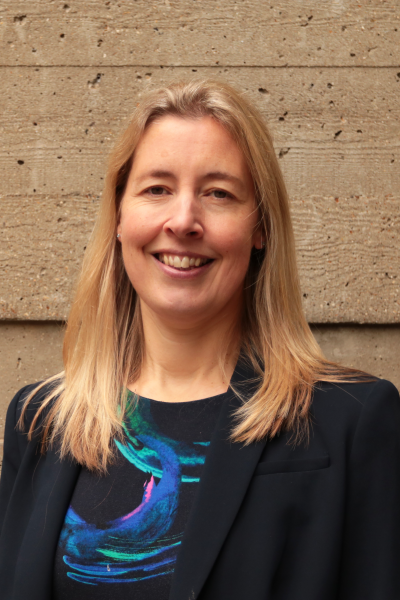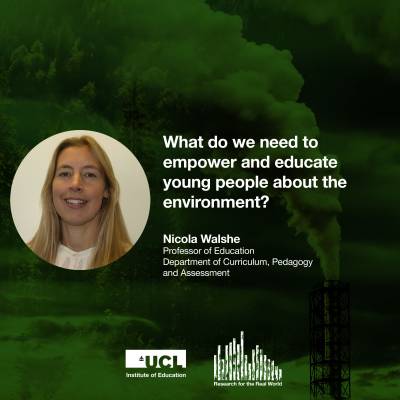Nicola Walshe is Professor of Education and Pro-Director: Education at IOE. She also leads the UCL Centre for Climate Change and Sustainability Education.
What attracted you to take up your position at IOE, UCL's Faculty of Education and Society?
IOE is renowned for its international leadership and world-leading research in teacher education; as such, I moved here with huge excitement about the prospect of working in this context with leading academics in my field.
IOE feels like a natural home for me – my own personal values resonate very clearly with the mission of the Faculty to improve lives through education and it is a privilege to be in a position to be able to contribute to this as Pro-Director: Education.
What might it surprise people to know about you?
“I have been trained to fire a rifle to defend myself from polar bears!
My PhD is in glaciology and as part of that I undertook field work in Svalbard in the High Arctic. Because of the danger of polar bears I had to be trained to carry and fire a rifle, although of course polar bears are protected and shooting one would be absolutely a last resort. Spending time in Svalbard was such a privilege, particularly as now, as a result of increasing temperatures through climate change, its landscapes are changing at an alarming rate.
What is the focus of your research and what benefits do you hope your discoveries or insights will bring?
I am a Geography Education researcher, with my recent work focusing predominantly on Environmental and Sustainability Education (ESE). My research encompasses evaluation of pedagogies for effective teacher education in climate change and environmental and sustainability education, understanding children and young people’s perceptions and value of sustainability and climate change, and the impact of nature-connectivity and children’s engagement with sustainability on their mental health and wellbeing.
A recent project, Eco-Capabilities, explored how children’s wellbeing can be supported through working with artists in nature and outdoor places. Our initial findings demonstrate significant changes among the children who participate, including increased resilience in and out of the classroom, greater collaboration and empathy between children, and strengthened relationships between children and teachers, particularly for those who struggle in classroom environments.
“Further, after spending time outdoors, children developed a greater sense of belonging in and being part of nature, with enhanced recognition and appreciation of biodiversity and of nature as a space for calm and inspiration.
As such, Eco-Capabilities has demonstrated the importance of providing time outdoors for all primary-aged children, both for their mental health and wellbeing, but also for developing an understanding of the importance of environmental sustainability.
What working achievement or initiative are you most proud of?
I am particularly proud of work I developed with colleagues in my previous role (at Anglia Ruskin University) to improve the experiences of our staff and students; this was undertaken with the aim of deeply embedding equality, diversity and inclusion into all our working practices and ensuring staff wellbeing was at the heart of all we did.
“From my perspective, we are all at our most productive at work when feeling fully respected and supported, and it is this that underpins all my work within IOE.
What's the most important thing you've learned from your students?
I have learned the power of hard work and absolute commitment, often against all the odds, in helping you to achieve your goals. I love working with all my students, but have particular admiration for those who have struggled within challenging contexts, often over many years, and come to university; these students often go on to excel in our courses, and I have no doubt will go on to make the most empathetic and effective education professionals.
“I am still in touch with a number of such students, and it is always a pleasure to hear how they are progressing in their various careers.
How do you think being in London benefits the work you do?
London is a really rich and diverse city, which I find acts as a stimulus for my work on a daily basis.
“I feel surrounded by an important history of academic learning, but also a reminder of the huge inequality that remains within our world and that we need to address.
Being in London also attracts students from a hugely diverse range of backgrounds, both nationally and internationally, which I feel as academics we all learn from.
What do you enjoy most about what you do?
One of the absolute joys of my role is the diverse range of colleagues that I get to meet and work with on a daily basis. IOE is a large and diverse Faculty, and I really enjoy meeting and listening to colleagues to ensure that collectively we are working as effectively as possible for the sake of our students and the wider communities in which we sit.
What other subjects outside of your area of specialism interest you?
I am really interested in social work education, the result of working with some fantastic colleagues and students in my previous role. I think the nexus between social work and education is particularly fascinating, and both social workers and education professionals could learn a lot from more interprofessional working.
Last updated 28 July 2023.
 Close
Close



